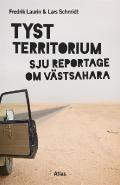Swedish research journalist in Norway

The journalist Fredrik Laurin (left) came to Norway last week to talk about his new book about the resource theft in Western Sahara. - When people hear where the fish or tomatoes are from, they don't want it! he says.
Published 06 November 2013
Morocco is exploiting natural resources from the occupied Western Sahara, and is earning vast sums of money from the export of phosphate, fish and vegetables. But what is the link between Sweden and this ongoing theft of resources?
This is the question that Fredrik Laurin and Lars Schmidt are asking in their new book Tyst territorium - sju reportage om Väst-Sahara (Silent territory - seven reportages about Western Sahara). The book deals with many sides of the occupation of Western Sahara, among them Swedish companies' involvement in the area. The authors make a clear point that Sweden, as part of the international community, not only has a diffuse responsibility for the suffering of the Saharawis, but is part of the occupation.
 Laurin and the co-author Lars Schmidt became interested in Western Sahara when they as two of the editors of the Swedish TV channel SVT's investigative journalism program Uppdrag Granskning ("Mission Investigation") investigated the export of fish oil from the occupied territories.
Laurin and the co-author Lars Schmidt became interested in Western Sahara when they as two of the editors of the Swedish TV channel SVT's investigative journalism program Uppdrag Granskning ("Mission Investigation") investigated the export of fish oil from the occupied territories. - The companies refused to talk, so we had to find other ways to get the truth out, says Laurin to the Support Committee for Western Sahara.
During the work with the program and the book they therefore used a wide range of creative methods to disclose the extensive, ongoing trade of products from Western Sahara. During the research phase of writing the book, they went as far as to tracing phosphate from Western Sahara in the European market using isotope analyses. This way they found traces of Western Sahara phosphate in Danish bacon.
Last week Laurin came to Norway to advertise his book. A topic he is particularly concerned about is the fish theft.
- It is incredibly provoking that 130 000 people - three generations - are sitting in refugee camps in Algeria, living on emergency aid from the UN, while 400 miles away the fish that belongs to the people in the refugee camps is plundered. Swedish fishermen have stolen their fish, that is completely absurd! says the dedicated journalist.
He has, however, not lost faith in a positive development, and it seems the release of the book has had some positive impact in Sweden. A week before a planned debate about the book, the Swedish state pension fund, which earlier has invested in companies involved in Western Sahara, stated that it now has divested from these companies. The reason for this, they stated, was the failure of their dialog attempts. Laurin himself, however, makes it clear that the reason must be the bad publicity directed towards the companies.
- The same thing happened with the tomatoes from the supermarket chains Axfood and ICA. When people get to know that the products they buy are stolen, they don't want them!
The book has been well received in Swedish media. See for example this editorial in the newspaper Dagens Nyheter or this one in Aftonbladet (in Swedish).
News
NY Check new Western Sahara poster!
“Try to Visit Western Sahara”…
10 July 2020
The Security Council fails Western Sahara and international law
On 31 October 2025, a new resolution was adopted in the UN Security Council calling on the Saharawis to negotiate a solution that would entail their incorporation into the occupying power, Morocco.
03 November 2025
Saharawis Demonstrate Against Trump Proposal
The United States has proposed in a meeting of the UN Security Council on Thursday that the occupied Western Sahara be incorporated into Morocco.
28 October 2025
Skretting Turkey misled about sustainability
Dutch-Norwegian fish feed giant admits using conflict fishmeal from occupied Western Sahara. Last month, it removed a fake sustainability claim from its website.
27 October 2025



